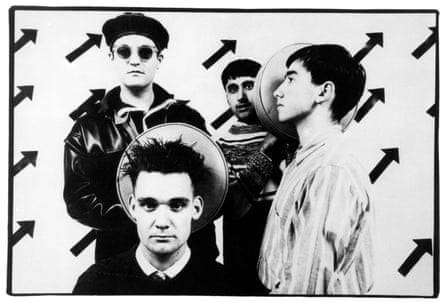Sean Dickson, vocals, guitar, arrangement
The early Soup Dragons were a psychedelic punk rock band, but by 1988 there was more energy in the underground acid house scene than the indie scene. We used to go to this club in Glasgow called UFO that looked like the 1960s party place in Midnight Cowboy. It was all oil lamps and psychedelic lighting, but they played Detroit techno.
Mother Universe, our more electronic single, started getting played in these clubs, so one of the promoters asked us to do a “PA”, a mimed performance. Afterwards, I went home to my flat and, in the early hours, watched the Rolling Stones in Hyde Park from 1969 on the BBC. Their song I’m Free stuck in my head. We had some spare studio time in London so I suggested doing it. I programmed a drum groove but, as I didn’t own a copy of the record, the riff that goes right through our version is actually based on me trying to sing it to the band. I didn’t know the lyrics so made up lines like: “I’m free to get my blues.”
After the second day of recording, we met the reggae singer Junior Reid at a party and asked him to sing with us. We’d just had the poll tax riots in Glasgow and the government were trying to close down raves, so I asked him to rap things like, “Don’t be afraid of your freedom”, based on some graffiti I’d seen on a wall. The song turned from a 60s idea of freedom to a concept about fighting for your right to party.
I wanted a gospel choir, so we looked in the Yellow Pages and found one. I had to fax over the lyrics to the pastor for approval so I changed them to stuff like: “I’m free to love God any old time.” We had 34 people singing the proper lyrics in the studio, though.
S’Express engineer/programmer Mark McGuire helped me make sense of the eight-minute collage we ended up with, spending 48 hours cutting and splicing bits of tape together. We didn’t get any sleep – Mark would run round the block to wake himself up, then carry on. When we played the finished single to someone from the record company, she burst out crying and said: “That’s absolutely amazing.”
It came out on Big Life – a dance label – and suddenly we were on Top of the Pops and in the Top Five. The music press called us “indie dance” in a derogatory way – and now it’s become a genre! In America, I’m Free was a big hit in the gay clubs. I came out as gay a few years ago, so I’m very proud of that.
Sushil K Dade, bass
In 1990, technology was becoming very affordable – you could get a secondhand Casio keyboard for £10. Club culture felt like the new psychedelia, obviously connected with participation in various substances. If you’re reading, mum, I never indulged, but it was all very exciting.
We had had a hard time making our Lovegod album, so having the spare studio time with no pressure was such a relief. It felt really joyous. We were just having a laugh, so there were loops going, people coming in and out of the session. Our guitarist Jim McCulloch and I did manage to look at the film of the Stones doing I’m Free, but our version isn’t a cover. It’s a meditation on it.
I struggled to play the fairly busy, complicated bassline so we recorded two parts and then sampled my bass and played it on the keyboard. It all felt very postmodern, then I threw some live bass on the chorus. After its release, the song catapulted out of our control. We were indie kids but were suddenly at a Grammys party and chatting with Dennis Hopper while Jon Bon Jovi walked past and Madonna had just left the building.
When Dua Lipa covered it, there was a video of her watching our version, which she used as a reference point. The Rolling Stones even did a Fatboy Slim remix of theirs, with a rapper on it. I like to think we took a wee jewel from their jewellery box and gave it some new sparkle. I’m Free made me the first Scottish Asian on Top of the Pops. Over the years, loads of other British Asian musicians have come up to me and said: “That was the moment I thought, ‘I can do that, too.’”

